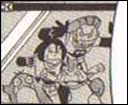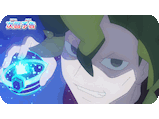
Adaptation



Main
Old Updates Archive
Links
 |
Lists |
List of Pokemon
Pokemon World Atlas
List of Techniques
List
of Items
List of Anime Episodes
 |
Guides |
Episode
Comparisons
Movies
& Specials Guide
CD Guide
DVD Guide
Voice
Actors Guide
Lyrics Archive
Manga Guide
Video Games
 |
Miscellaneous |
Humor
Pokemon Bashing
Features
Rants
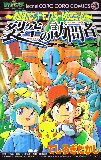
When the June and July 2004 issues of CoroCoro Comics came out, fans were treated to their first taste of the plot to the latest Pocket Monsters Advanced Generation movie, Rekku no Houmonsha Deokishisu. Expectations were high as the manga showed an epic battle, a mascot pokemon who was actually useful, and a villain who actually did something villain-like.
However, when the movie actually came out, something was...different. As synopses emerged from fans who had actually been in Japan to see the movie, fans noticed that the movie was very different from the manga. It seems that the manga artist, Teshirogi Takashi, had taken quite a number of liberties with the manga adaptation of the film. It's not too surprising, considering that his adaptations of the TV anime that he does in his manga Satoshi and Pikachu are just as different from their source materials, but it still took a lot of fans by surprise.
What follows is an outline of the major differences between the manga version of the story and the anime version. The guide is not exhaustive by any means, but it does touch upon the points that I felt were worth mentioning.
| Dream vs. Real Life
In the manga, the opening battle between Rayquaza and Deoxys is just a nightmare that Toh'i has. It's treated like a flashback, meaning that the story of Rekku no Houmonsha Deokishisu, as written in the manga, begins in the present day. The movie, however, begins four years in the past. After the battle, we skip ahead four years (as indicated by the "Four Years Later" screen in the movie) to the present day. |
| Rondo-Hakase's Assistant
So why make such a huge change? Why make Rondo-Hakase's lab assistant the villain of the story? My guess is that Teshirogi-san was bored with the main Deoxys versus Rayquaza plot, so he decided to add the Haruno subplot to make things more interesting for him. Personally, I would have liked to see Haruno in the actual movie, since his anime counterpart isn't any different from every other movie's random character of the day, but that's all water under the bridge now. |
| The Mechanical Dog/Blobo
For a time, many people speculated that the robotic dog was a fourth generation pokemon, much like Gonbe is. However, no name was given for the little dog, and the CoroCoro Comics magazine never did a feature on the little guy. Still, there was still a clear division between fans who thought that the Mechanical Dog was a new pokemon and those who thought that it was just another gadget in LaRousse City. As it turns out, the Mechanical Dog was just a creation of the manga artist, Teshirogi Takashi. The dog's role is replaced by the infamous Blobo in the actual movie, and since the Blobo play such a significant part in the movie, it's doubtful that Teshirogi Takashi wouldn't have known about their existence. So why change it? If I had to guess, it would just be another example of Teshirogi-san wanting to be creative. I mean, if you think about it, what better way is there to attract attention to your manga then featuring what could be a new pokemon?
Page
13: CoroCoro Edition (Mechanical Dog) |
| Getting to the Battle
Tower
In the manga, the mischievous pokemon Plusle and Minun steal Satoshi's hat shortly after he arrives in LaRousse City. In the ensuing chase, Satoshi is lead to the Battle Tower, where he then encounters Toh'i. Satoshi arrives at the Battle Tower in a completely different way in the anime. Satoshi gets himself trapped on one of the automatic sidewalks in LaRousse City and has to be rescued by Ryuu and his Bashamo. It is then when he meets Ryuu, Shouta, Audrey, Catherine, and Hitomi. In the manga, he doesn't meet Ryuu and Shouta until his Battle Tower battle with them, and he doesn't meet any of the ladies until after Deoxys begins its attack. |
| Gonbe the Super Pokemon
Gonbe was one of the main attractions of the second Advanced Generation movie. The never-before-seen fourth generation pokemon was a mystery to most, and fans grasped onto whatever trickle of knowledge was revealed. We knew that his name was Gonbe, we knew a few basic stats, and we were pretty certain that he was the pre-evolved form of Kabigon. But other than that, we didn't know anything about what kind of attacks it had or about what kind of personality he had.
In the manga, however, it's Gonbe who saves everyone from certain doom. When the gang are being attacked by the Shadow Deoxys for the first time, Gonbe steps up and unleashes a massive yawn/beam attack, completely disintegrating the Shadow Deoxys. After the smoke clears, Gonbe merely walks away, as if it had done nothing at all. What's amazing is that Gonbe single-handedly took out over a dozen Shadow Clones, all of which were able to overpower such powerhouses as Bashamo, Kamex, and Metagross. Suddenly, Gonbe went from being an annoyingly useless comic relief pokemon to being an invaluable part of the plot. My only guess as to why this was changed was because Teshirogi Takashi wanted to make Gonbe more special. He probably guessed that the little guy would be given the title of "yet another useless pre-evo pokemon" (well, he did guess correctly...) so he went and bulked it up a bit. |
| The Epic Battle
The battle between Deoxys and Rayquaza was pumped up to be this epic clash of the titans. In the manga, the two met over LaRousse City and fought one another nonstop rom the instant the two arrived until a few pages from the end of the comic. However, in the anime, the two barely fought at all. Deoxys had put up a barrier over the city to prevent anyone from getting in or out, and that included Rayquaza as well. The ozone pokemon wasn't able to break through (and thus, begin to battle Deoxys) until the end of the movie, and even then the two only fought for about five or ten minutes. So in the manga, we have a huge, Dragon Ball Z-like battle. In the anime, we have a buildup to the big battle, and then...ten minutes of Hyper Beams going back and forth. Whoo. I think it's obvious why the manga artist changed the manga version. |
Found an error? Spot an omission? Please help me keep this page current and error-free by e-mailing me with a description of the error or omission.


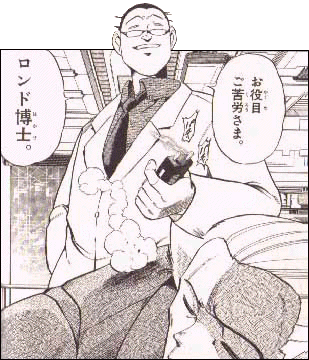 Perhaps
the biggest difference between the manga and the movie can be found in
Rondo-Hakase's lab assistant. In the movie, she's a caring young
woman named Yuuko. In the manga, he's a backstabbing,
glory-hungry
man named Haruno. While Yuuko is a caring assistant who treats
Toh'i
like her own son and does whatever Rondo-Hakase asks her to do, Haruno
wants the crystal core of Deoxys for himself, going so far as to knock
Rondo-Hakase unconscious and hiding his body from Satoshi-tachi in
order
to obtain it. Haruno eventually turns over a new leaf when the
Shadow
Deoxys start attacking him, and he exits the manga by simply smiling
and
walking off by himself.
Perhaps
the biggest difference between the manga and the movie can be found in
Rondo-Hakase's lab assistant. In the movie, she's a caring young
woman named Yuuko. In the manga, he's a backstabbing,
glory-hungry
man named Haruno. While Yuuko is a caring assistant who treats
Toh'i
like her own son and does whatever Rondo-Hakase asks her to do, Haruno
wants the crystal core of Deoxys for himself, going so far as to knock
Rondo-Hakase unconscious and hiding his body from Satoshi-tachi in
order
to obtain it. Haruno eventually turns over a new leaf when the
Shadow
Deoxys start attacking him, and he exits the manga by simply smiling
and
walking off by himself.  In
the June 2004 installment of the manga, Satoshi and the gang are
greeted
by an unnamed mechanical dog. The dog, which welcomes the group
to
LaRousse City, tries to give everyone a Passport. However, the
dog
is mostly ignored, and, after appearing for only two pages, disappears
for the rest of the manga.
In
the June 2004 installment of the manga, Satoshi and the gang are
greeted
by an unnamed mechanical dog. The dog, which welcomes the group
to
LaRousse City, tries to give everyone a Passport. However, the
dog
is mostly ignored, and, after appearing for only two pages, disappears
for the rest of the manga.  Interestingly
enough, Teshirogi Takashi later replaced the pictures of the Mechanical
Dog in the manga with the Blobo when the manga was collected for the
tankouban.
My guess is that the change was done to give the manga more continuity,
since it would have been strange to see the Blobo come out of nowhere
at
the end of the manga had the Mechanical Dog remained.
Interestingly
enough, Teshirogi Takashi later replaced the pictures of the Mechanical
Dog in the manga with the Blobo when the manga was collected for the
tankouban.
My guess is that the change was done to give the manga more continuity,
since it would have been strange to see the Blobo come out of nowhere
at
the end of the manga had the Mechanical Dog remained. 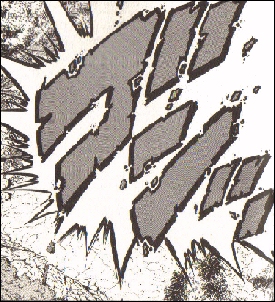 The
manga helped shed some light on Gonbe...or so we thought. In the
manga, the gang is attacked by a group of Shadow Deoxys inside the
botanical
garden. That much is seen in the film. However, the way
they
get out of it is completely different. In the anime, Ryuu's
Bashamo
and Satoshi's Pikachu are able to fend the Shadow Clones off long
enough
for everyone to escape.
The
manga helped shed some light on Gonbe...or so we thought. In the
manga, the gang is attacked by a group of Shadow Deoxys inside the
botanical
garden. That much is seen in the film. However, the way
they
get out of it is completely different. In the anime, Ryuu's
Bashamo
and Satoshi's Pikachu are able to fend the Shadow Clones off long
enough
for everyone to escape. 